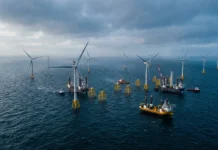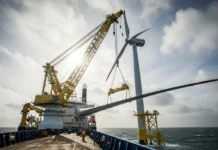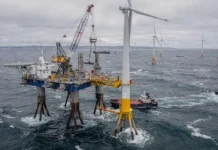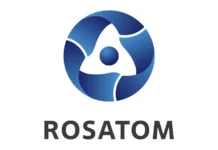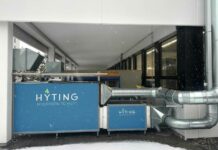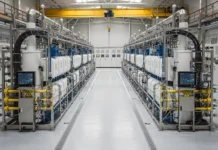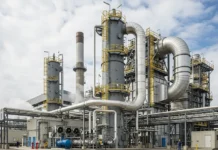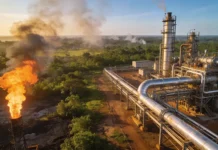The European Investment Bank (EIB) is starting a €5 billion program to help European companies that make wind energy equipment by giving Deutsche Bank AG in Germany a €500 million counter-guarantee. Deutsche Bank will be able to set up a collection of up to €1 billion in bank guarantees for new investments in wind farms in the EU thanks to the deal.
The deal is the first thing the EIB will do as part of its plan to provide €5 billion to improve commercial bank guarantees for companies in the European wind industry by December 2023. The plan is part of an EU Wind Power Package that the European Commission presented in October 2023. Its goal is to keep the EU’s wind energy supply chain healthy and competitive. It expects counter-guarantees to be given to the big lenders in the area, such as Deutsche Bank.
For the economy to become less carbon-based, EIB Vice-President Nicola Beer said that wind power needs to be increased quickly. Deutsche Bank and I are working to increase the use of renewable energy in Europe. This will lower the cost of this type of energy. The project in question will also help protect and create jobs in a European business that is strong and competitive.
As part of its €5 billion plan, the EIB offers counter-guarantees to help private banks share the financial risks they face when doing business with people in the wind industry. Access to advance payment and performance guarantee lines is made easier by the instrument, which is good for both banks and the industry.
Deutsche Bank will use the EIB’s support for this first project to give financial promises to companies that make wind energy. This way, the makers will be able to get paid in advance and offer success promises when they take on new wind projects. The guarantee plan also lets makers pay their suppliers ahead of time for wind farms and the parts of the wind value chain that go with them, like wires, power stations, turbines, and facilities for connecting to the grid.
It is expected that the €1bn guarantee fund between the EIB and Deutsche Bank will lead to private investments of up to €8 billion.
Both the speeding up and the general size of the energy shift require huge investments, as well as security and guarantees. Alexander von zur Muehlen, CEO of Asia Pacific, Europe, Middle East & Africa (EMEA) and Germany and Member of the Management Board at Deutsche Bank, said, Their agreement with the EIB gives wind manufacturers real extra guarantee volumes that they need to win and carry out large projects. These partnerships between the private sector and the public sector will be a key part of funding the success of the digital and long-term change, von zur Muehlen said.
Up to now, the wind power industry in the EU has been a success story. However, there are still problems in the supply chain caused by unclear demand, slow project permits, supply-chain bottlenecks, high inflation and product prices, and more competition from other countries.
The agreement between the EIB and Deutsche Bank shows how risk-sharing tools can be used to deal with these kinds of problems and, by extension, make sure that green transition projects get funded. Counter-guarantees make it possible to get more money, which can then be used to meet the higher output needs of wind energy development.
The EU’s goal of using only sustainable energy will be reached in large part by wind energy. By the end of the decade, the EU will need to get 45% of its energy from green sources. To do this, existing wind power will need to grow by 117 gigawatts (GW). The EIB’s €5 billion plan will help build 32 GW.
Without a strong clean tech production sector in the EU, the switch to clean energy will not work. Maroš Šefčovič, Executive Vice-President for European Green Deal, Interinstitutional Relations and Foresight, said that this project will help the European wind business get the money it needs to keep growing both in Europe and around the world.
Wind energy is very important for Europe to reach its big goal for renewable energy. To make that happen, we need to keep helping our equipment makers. This way, Europe can move forward with the green shift while staying competitive and making sure there are green jobs. As part of the European Wind Power Package, this timed project with the EIB is an important product that will bring in capital and help the wind sector, said Kadri Simson, Commissioner for Energy.
Information about the past
As the European Union’s long-term lender, the EIB Group does its job. It pays for smart investments that help the EU reach its goals and works together with other EU institutions and groups to push for things like fair growth and a fair shift to climate neutrality. A total of €88 billion in new loans were signed by the EIB Group in 2023. Of this amount, €8.6 billion was signed in Germany.
It is in line with the Paris Agreement for all new projects that the EIB Group funds. Spending money on fossil fuels that doesn’t lower CO2 pollution won’t get any money back. In its Climate Bank Roadmap, the EIB Group promised to support €1 trillion in investments in climate action and environmental development over the next ten years. This goal is still on track. More than half of the EIB Group’s annual loans go to projects that directly help fight climate change, adapt to it, and make the world better. About half of the EIB’s money in the European Union goes to cohesion regions, which are areas with lower per head income. This helps everyone grow and brings living standards closer together.
To help the wind industry deal with its own problems, like uncertain and low demand, slow and hard to understand permits, limited access to raw materials, and high inflation and commodity prices, the European Commission released the European Wind Power Package in October 2023. In a specific Action Plan, the Commission laid out a number of steps to make sure that the switch to clean energy is accompanied by increased industry competitiveness and that wind power continues to be a success story in Europe. These steps included changes to permits, bid designs, skills, and access to finance.
Deutsche Bank has a lot of different financial services, from credit and payment processes to investing advice and asset management and services that focus on the capital markets. For example, it works with private clients, small businesses, big businesses, the government, and large companies. Deutschlands größte bank, Deutsche Bank, has roots in Europe and a network of branches around the world.










